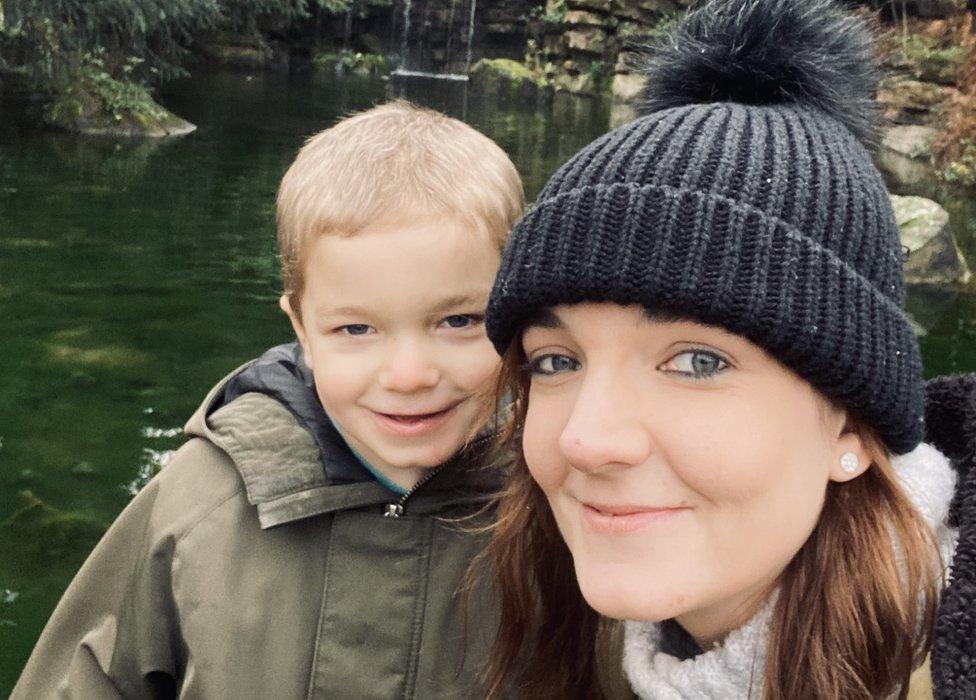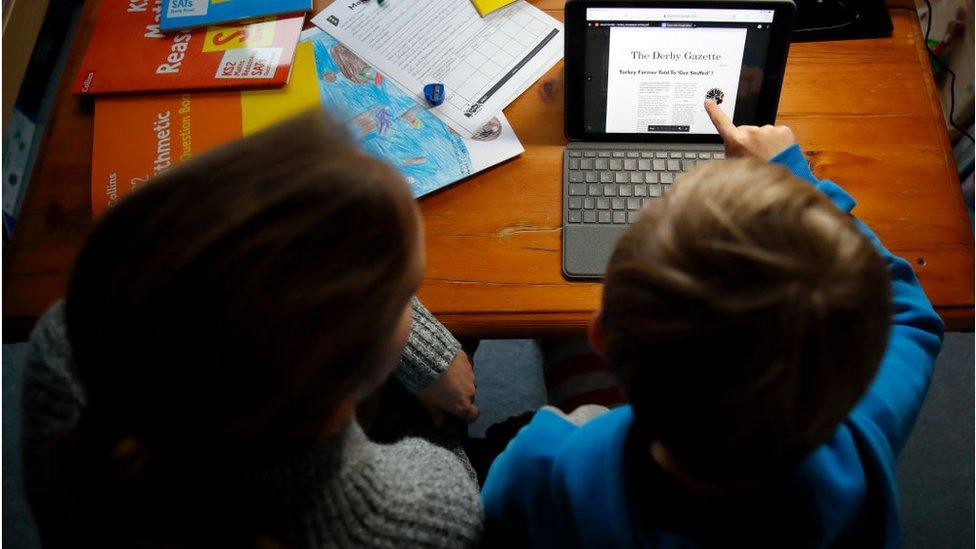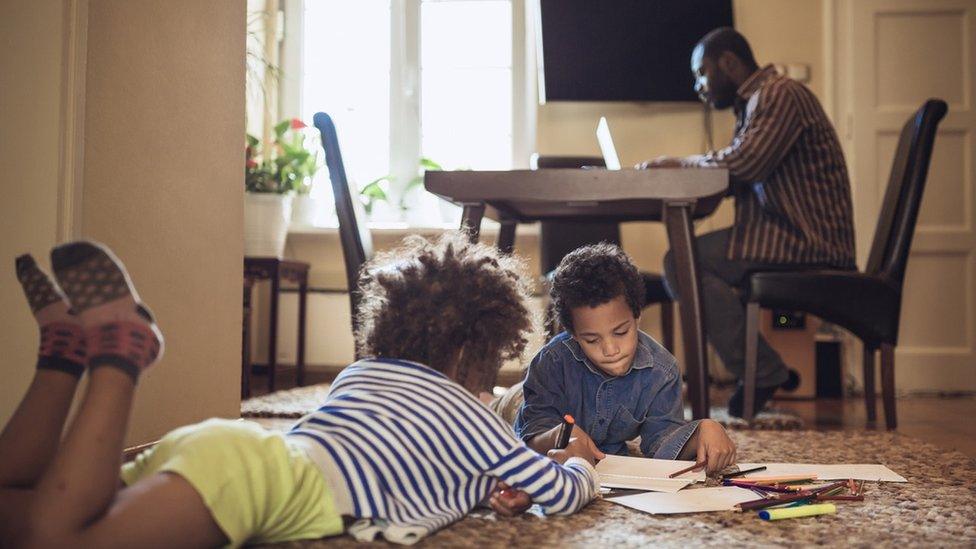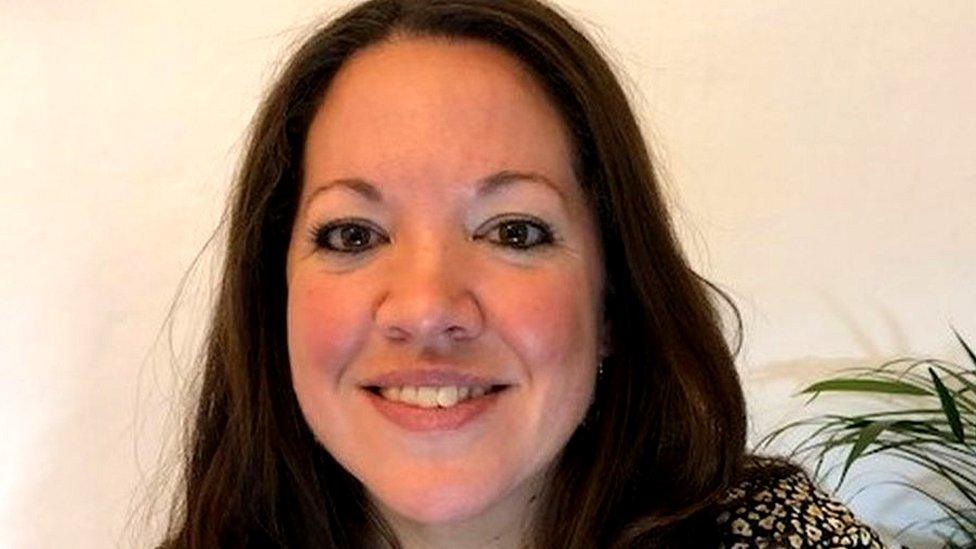Coronavirus: 'I quit my job to home school my son'
- Published

Occupational psychologist Analise quit her job to take care of her child
When schools were closed in the first lockdown last year, Analise thought she could juggle home-schooling her son with her occupational psychologist job.
But as things dragged on, she became increasingly exhausted and eventually realised she had no choice but to quit.
Analise is one of many parents whose employer has refused them furlough to take care of their children.
More than 2,000 working mothers said that they had recently been refused furlough, according to the TUC union.
The Women's Budget Group (WBG) and the Fawcett Society, which canvassed just over 1,000 parents, found twice as many mothers (15%) reported having to take time off work with no pay due to school closures or a self-isolating/sick child compared with fathers (8%).
And when it comes to who is responsible for childcare, 58% of mothers said "mostly me" compared with 23% of fathers.
Analise, who has an eight-year-old son, said she was starting work at 9pm and working through to the early hours, "just to try and juggle" everything.
"It was completely overwhelming, my mental health suffered."
What she needed was to be put on furlough, she says. But her employer, a small business that was busy in the pandemic, thought it would be unfair to other staff who had to keep working - most of whom didn't have children.
First Analise used all of her annual leave for childcare, then combined taking unpaid leave with spreading her hours out across the week.
But it wasn't enough, and as her husband earned more than her, she had to be the one who quit to focus on the childcare.
"It was devastating to walk away from my career without a backup plan. But my employer couldn't see I was being asked to do the impossible."
All schools had to shut in the first lockdown, and only three months after pupils began to filter back in in September they closed again.
It's left parents having to cover around six hours of home-schooling a day for months on end. And women seem to be bearing the brunt.
'Absolute nightmare'
Pregnant Then Screwed, a campaign group for mothers, says calls to its advice lines have quadrupled since March, as women seek information about how their childcare responsibilities might affect their careers.
"Loads of mothers were made redundant over summer and thought it was discrimination because their performance might have been affected with picking up extra childcare responsibilities," says chief executive Joeli Brearly.
"It's home-schooling that has proven an absolute nightmare. If you have primary [school] age children you can't leave them to their own devices."

Kayleigh and her son Charlie
Kayleigh, a nursery worker from Nottingham, has been on maternity leave for 10 months looking after her second child - but she has already told her employer she won't be going back.
The issue is they can't give her the flexible hours she needs to look after her four-year old, Charlie, who started school in September.
"With both me and my partner intending to work full time we would need before- and after-school care for him when he goes back in March.
"But his school can't offer that because of Covid and we can't afford to pay childminders alongside full-time childcare for the baby. "
Kayleigh feels anxious about applying for new jobs, fearing no one will offer her the hours she needs. And she says that while she and her builder husband are surviving, it's "hand to mouth".
The flexible furlough scheme, external allows firms to decide the hours and shift patterns of their employees, with the government continuing to pay 80% of salaries for the hours they do not work.
But Ms Brearly says bosses have become more resistant to using it, as many have had to make redundancies and want their remaining staff working at "maximum productivity" as they try to rebuild their businesses.
"And we're hearing that the pressure from schools is different this time around. Some parents have received notifications saying they will be punished in some way if they don't fulfil some home-schooling responsibilities."
'It's reshaped my identity'
Rebecca, a self-employed art therapist from Surrey, had her first child last March and wanted to go back to work after six months.
But she's had to shelve that plan because her husband is shielding with a rare type of diabetes. That means they can't put their daughter in nursery and someone needs to stay home with her.
"My husband is infinitely less qualified than I am but he earns infinitely more than I do. So it was never even a question who would do the childcare."

Putting her business on hold was not only heartbreaking, she says, it has "reshaped her identity".
"I knew I was going to be a mother but thought it would just be one facet of who I am. I've always loved working, it is really important to me."
Being financially reliant on her husband is also something she feels uncomfortable with. And while she has been able to access financial support for the self-employed, it is "nowhere near" what she'd normally get paid.
'Don't kill yourself'
Pregnant Then Screwed says the government should do more for parents forced to give up work because of childcare. It says accessing the flexible furlough scheme should be a legal right for employees, not at the discretion of bosses - although critics say this would be impractical for many employers.
It also wants struggling parents to get a period of paid leave.
Ms Brearly's message for employers is to be compassionate: "If you look after women now during this crisis, they are going to look after your business."
A spokesman for the Treasury said: "We encourage both employers and employees to be as flexible as possible to support colleagues with childcare responsibilities.
"It's been clear since the first lockdown that employers can furlough eligible employees who have childcare responsibilities, including because of school closures."
He added: "We also have set out a comprehensive package of support for businesses and families aimed at protecting as many jobs and supporting as many people as much as possible - our furlough scheme alone has protected 9.9 million jobs."
- Published12 January 2021

- Published26 January 2021

- Published7 January 2021
